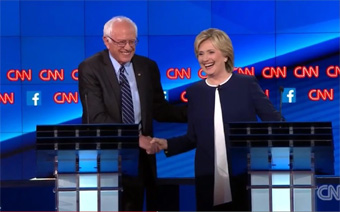
Image courtesy of CNN
Sanders:
Clinton’s “Victory” a “Rush to Judgment”
| published June 7, 2016 |
By R. Alan Clanton, Thursday Review editor
Democratic Presidential candidate Bernie Sanders says that the media—in collusion with certain people within the campaign of Hillary Clinton—has sought to suppress voter turnout in several key states the day before primaries and caucuses will be held.
Sanders calls the decision by some media outlets and the Clinton campaign to declare victory, only one day before pivotal primaries in California, New Jersey and several other states, nothing less than “a rush to judgment.” He also said he was greatly “disappointed” by some in the popular press.
On Monday, some media sources, including the Associated Press and NBC News, along with several top Clinton surrogates, declared that front-runner Hillary Clinton had already reached the required number of delegates to secure the nomination at the Democratic National Convention this summer. The totals were based upon adding committed and allotted delegates won during the long primary and caucus season with the announced pledges of so-called super delegates—party leaders and elected officials given delegate voting rights but who are not required to vote a certain way, and can, in fact, change their minds at any time.
Clinton currently maintains a wide lead with the super delegate count. Clinton has the support of more than 570 super delegates; Sanders has the commitment of about 46, though his campaign team is working feverishly to convert some of those to his side, or at least the “neutral” column. In recent days Sanders has also added that a few super delegates have already switched sides and are backing his candidacy over Clinton’s.
Campaigning in California early on Tuesday, Clinton was already sounding a victorious tone, telling supporters that with only hours, the Democratic race would be over and that she was on the “verge of victory.”
But Sanders says that declaring “victory” based on totals which include the support of super delegates is not merely fuzzy math, but is deeply misleading. The votes of super delegates, Sanders says, are not official or even reliably calculable until the time of voting in late July. Therefore, Clinton’s declaration and media reports to the same tune are premature, and can only have the effect—intended or unintended—of suppressing voter motivations in primary and caucus states which go to the polls on Tuesday, at least according to the thousands of Sanders supporters who took to social media to complain that Clinton was seeking to steal the show.
Interviewed by NBC News’ Lester Holt on Tuesday, Sanders stopped just short of declaring Clinton’s declaration of victory a form of voter suppression, but agreed that the media reports and Clinton’s rapid embrace of the title presumptive nominee was not merely premature, but possibly misleading to many voters—especially in the most populous state, and the one with the biggest delegate prize—only hours before those same voters would go to the polls.
In fact, Sanders says, even if Clinton does win in the two biggest Tuesday states—California and New Jersey—under the proportional rules created by the DNC, Clinton will still fall far short of the required number of delegates to win on the first round of balloting at the convention this summer.
Sanders makes no secret of the fact that his only path to the Democratic nomination now resides in a plan to convince enough super delegates to switch their allegiances from Clinton to Sanders between now and the start of the convention. If Sanders can deny Clinton a first round win at the convention, he may be able—he believes—to rally the support of other delegates as they become “unlocked” from their pledges and able to change sides.
Sanders’ key argument—indeed central to his message—is that in many polls he performs better than Clinton in head-to-head match-ups with Donald Trump in the general election. Sanders also makes the point that he maintains high positive polling and none of the negative polling associated with Clinton—a fact sure to shape the ebb and the flow of the campaign narrative after the conventions. Sanders also believes he will be a better debater in one-on-one forums against Trump, now the presumptive Republican nominee.
In the meantime, Sanders—who has in the last two days offered mixed signals as to his intentions in the event he loses in California and/or New Jersey—sounded a more defiant tone with reporters and supporters as the day wore on, insisting that he will remain in the fight right up to the start of the convention. Sanders insists that the support of super delegates is fleeting and subject to change, and that since those votes do not officially count until the moment of the roll call, he refuses to accept the claims of the Associated Press and NBC News that Clinton has already clinched the nomination.
Related Thursday Review articles:
Clinton Clinches Puerto Rico and Virgin Islands; Thursday Review; Thursday Review; June 5, 2016.
Jerry Brown Endorses Hillary Clinton; R. Alan Clanton; Thursday Review; May 31, 2016.
